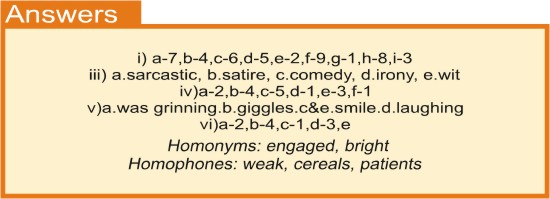|
Education


What
do you find amusing? What makes you laugh out loud? Do either
of these jokes make you laugh?
In the box below are different types of humour. Do
you know the difference? Which is your favourite? Which makes
you laugh most?

i)
Have a look at these definitions and put one of the words
in the correct space.
a. A __________
is a piece of writing (or music or art) which copies the style
of someone famous or a particular situation, making the original
look ridiculous.
b. A __________ is usually a short, narrative story which
aims to make people laugh.
c. __________ is a general word to indicate the ability to
use words in a clever and humorous way.
d. ___________ is a kind of humour in which things seems ridiculous
or meaningless.
e. _________ is a very general word to describe the things
that make people laugh or amuse them.
f. __________ is a way of criticising people or ideas in a
humorous way, or a piece of writing or play which uses this
style.
g. __________is making a joke about something that is not
usually considered to be funny or is a taboo subject. Humour
about sad events (jokes about the death of Princess Diana,
for example) would be examples of this.
h. ___________ is saying something which mean the opposite
of what they say, and which is said in order to hurt someone's
feelings or to criticise something in an amusing way.
i. The literary definition of ______ is "saying one thing
and meaning another" for example, pretending to be serious
about something while really making fun of it.

iii)
Use the correct form of one of the words in the box to complete
these sentences.

a. The
comedian was angry and bitter and showed his rage in a satirical
monologue that was bitingly _________ and utterly scathing
about the world today.
b. If you read his novels, you can see that this writer was
actually very fond of his country, and described it in terms
of a gentle __________, making fun of it, but in an affectionate
way.
c. Shakespeare's Titus Andronicus has been interpreted as
not being a comedy at all, but has instead been shown as full
of a black ________, ironic and comic in its tragedy.
d. In this novel the crushing __________ is that the narrator
is completely ignorant of what is really happening, it ends
up being wickedly funny!
e. Full of classical allusions and literary quotations, this
book isn't exactly a belly laugh, but has a learned _________
which may raise a smile.
iv)
Which verb describes what you do in the situations that follow?

a. someone
says something funny
b. something unpleasant happens to someone you don't like
c. you have just passed an important exam
d. someone shows you their new baby
e. you are fifteen years old and very silly and your friend
says
something funny while the teacher is talking
f. someone takes a photo of you
v)
Which of the words above would you use to complete
these expressions?
You will need to change the form of the words.
a. He
had won. He was so happy he ______________ from ear to ear.
b. During the lesson, three girls at the back got the _______________
and had to leave.
c. I'm going to wipe that ____________ off your face. The
next time you speak in class, you will go and see the headmaster.
d. Stop ______________ at me! I didn't mean to fall in the
water. It's not fair.
e. Look at the camera, and give me a big _____________.
vi)
Match the first line of the children's jokes
with the second line,

The jokes
above are funny (for children!) because one word in each joke
has two meanings. These words are homonyms - one word with
two meanings. For example, fine = good, as in a fine day,
or something you must pay, as in a parking fine,
or homophones - two words that look different and have different
meanings, but sound the same. For example, male and mail.
Which
words in B are homonyms and which are homophones? Can you
think
of other examples of homonyms and homophones in English?
Can you
explain this joke to a friend?


Copyright
(R) thedailystar.net 2005 |
